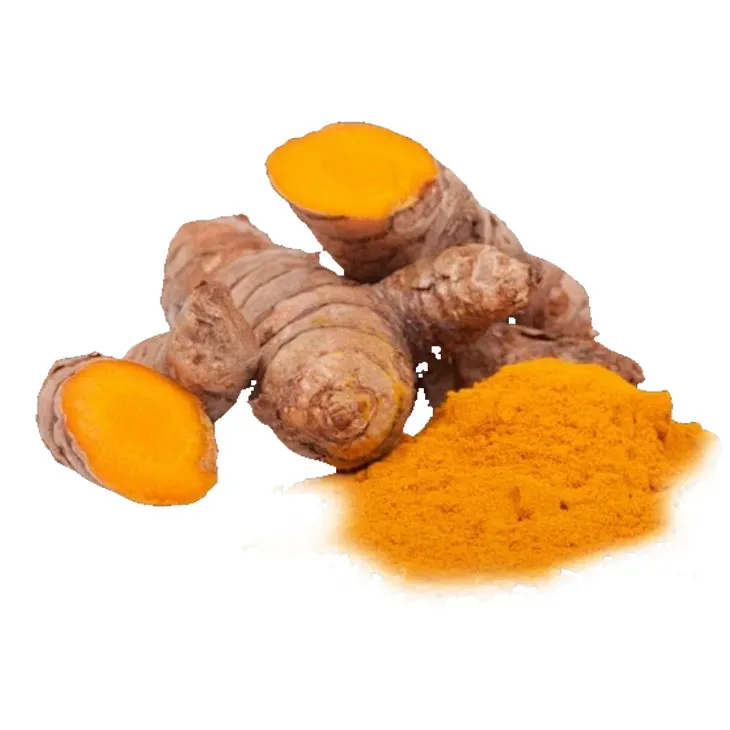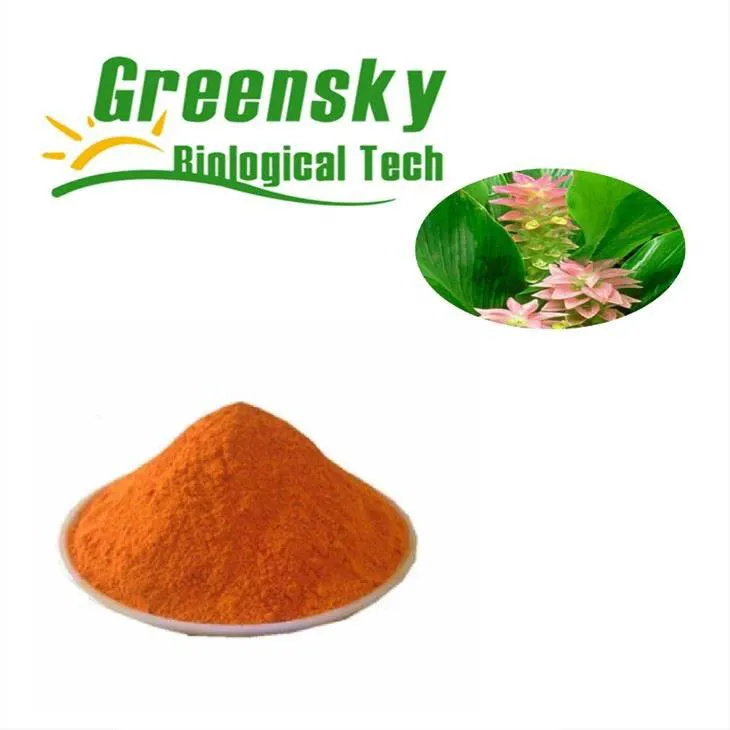- 0086-571-85302990
- sales@greenskybio.com
Benefits of Curcumin in Cattle Feed.
2024-11-11

1. Introduction
In the world of cattle farming, the search for effective additives to improve animal health and productivity is ongoing. Curcumin, a natural compound derived from the turmeric plant (Curcuma longa), has emerged as a promising candidate for inclusion in cattle feed. This article will explore the various benefits that Curcumin offers when incorporated into the diet of cattle.

2. Anti - Microbial Properties
2.1 Inhibition of Pathogenic Microorganisms
- Curcumin has been shown to possess strong anti - microbial properties. It can act against a wide range of pathogenic microorganisms that may infect cattle. These include bacteria, viruses, and fungi. For example, certain bacteria such as Escherichia coli and Salmonella species are common pathogens in cattle. Curcumin can disrupt the cell membranes of these bacteria, leading to their death or inhibition of their growth.
- In the case of viral infections, while curcumin may not directly kill the virus, it can modulate the immune response of the cattle. By enhancing the innate immune system, it can help the animals better combat viral invaders. This is crucial as viral diseases can have a significant impact on the health and productivity of cattle.
- Fungal infections, although less common than bacterial infections in cattle, can also be a problem, especially in humid environments. Curcumin has antifungal activity that can prevent the growth and spread of fungi such as Aspergillus species in the cattle's body.
- The gut microbiome of cattle plays a vital role in their overall health. Curcumin can help maintain a balanced gut microbiome. It can selectively promote the growth of beneficial bacteria such as Lactobacillus and Bifidobacterium species. These beneficial bacteria are involved in various functions such as digestion of feed, production of vitamins, and modulation of the immune system.
- By suppressing the growth of harmful bacteria in the gut, curcumin can reduce the incidence of gut - related diseases in cattle. This is important as gut health is directly related to the absorption of nutrients from the feed. A healthy gut microbiome ensures that the cattle can efficiently extract the necessary nutrients from their diet, leading to better growth and development.

3. Stress Management
3.1 Types of Stress in Cattle
- Cattle in modern farming systems are exposed to various types of stress. Environmental stressors such as extreme temperatures (both heat and cold), humidity, and poor air quality can affect their well - being. For instance, during hot summer months, cattle may experience heat stress, which can lead to reduced feed intake, decreased milk production in dairy cows, and even mortality in severe cases.
- Management - related stress is also common. This includes factors such as overcrowding, transportation, and changes in feeding routines. For example, when cattle are transported over long distances, they may experience stress due to confinement, noise, and vibration in the transport vehicle.
- Nutritional stress can occur when the diet of cattle is not balanced or when there is a shortage of essential nutrients. This can lead to weakened immune systems and reduced growth rates.
- Curcumin can modulate the physiological responses of cattle to stress. It can act on the hypothalamic - pituitary - adrenal (HPA) axis, which is involved in the stress response. By regulating the release of stress hormones such as cortisol, curcumin can prevent excessive stress responses in cattle.
- It also has antioxidant properties that can help protect the cells of cattle from oxidative damage caused by stress. Oxidative stress is often associated with various stressors, and by reducing this damage, curcumin can improve the overall health and resilience of the animals.
- In addition, curcumin can enhance the immune system of cattle, which is often compromised during stress. A stronger immune system enables the animals to better resist diseases that they may be more susceptible to during stressful periods.

4. Productivity Enhancement
4.1 Improvement in Feed Efficiency
- One of the key benefits of curcumin in cattle feed is its potential to improve feed efficiency. Curcumin can enhance the digestion and absorption of nutrients from the feed. It can stimulate the secretion of digestive enzymes in the gut, such as amylase, protease, and lipase. These enzymes are essential for breaking down carbohydrates, proteins, and fats in the feed, respectively.
- By improving the digestibility of feed, curcumin can reduce the amount of feed required to achieve the same growth rate in cattle. This not only saves on feed costs but also has environmental benefits as less feed waste is produced.
- Moreover, curcumin can improve the bioavailability of nutrients in the feed. It can help in the absorption of minerals such as calcium, phosphorus, and zinc, which are important for bone growth, milk production (in dairy cows), and overall health of the animals.
- The improved feed efficiency due to curcumin leads to better growth and development of cattle. Calves fed with curcumin - supplemented feed may show faster growth rates, reaching market weight earlier than those without curcumin in their diet.
- In dairy cows, curcumin can also have a positive impact on milk production. It can increase the quantity and quality of milk produced. The improved nutrient absorption can lead to higher milk protein and fat content, which are important factors in determining the value of milk.
- Additionally, curcumin may play a role in improving the reproductive performance of cattle. It can enhance the fertility of both male and female cattle by improving their overall health and hormonal balance. This can lead to increased breeding success and a higher number of healthy offspring.

5. Conclusion
In conclusion, curcumin offers a multitude of benefits when included in cattle feed. Its anti - microbial properties help in controlling pathogenic microorganisms, its role in stress management is crucial for the well - being of cattle in modern farming conditions, and its contribution to productivity enhancement makes it a valuable additive. As research on curcumin in cattle continues, it is likely that more benefits will be discovered, further highlighting its potential in the field of cattle farming. However, further studies are still needed to optimize the dosage and formulation of curcumin in cattle feed to ensure maximum efficacy and safety.

FAQ:
1. How does curcumin control the growth of pathogenic microorganisms in cattle?
Curcumin has anti - microbial properties. These properties likely interfere with the normal functions of pathogenic microorganisms in the cattle's body, such as inhibiting their cell division or disrupting their metabolic processes, thus controlling their growth.
2. What are the common stressors in modern farming conditions for cattle?
Common stressors include overcrowding in barns, changes in diet, exposure to extreme temperatures, and transportation. These factors can disrupt the normal physiological and behavioral patterns of cattle, causing stress.
3. How does curcumin help cattle adapt to stressors?
Curcumin modulates the physiological responses of cattle. It may regulate the release of stress - related hormones or enhance the function of the immune system, enabling the animals to better cope with stressors.
4. How can curcumin improve feed efficiency in cattle?
Curcumin can enhance the digestion and absorption of nutrients from the feed. It might influence the activity of digestive enzymes or improve the integrity of the intestinal lining, which leads to more efficient utilization of the feed for growth and development.
5. Are there any potential drawbacks of using curcumin in cattle feed?
Currently, while the benefits are well - documented, potential drawbacks are not widely reported. However, factors such as proper dosage need to be carefully considered. An excessive amount of curcumin could potentially disrupt the normal physiological balance in cattle, although this requires further research.
Related literature
- The Role of Curcumin in Animal Nutrition"
- "Beneficial Effects of Curcumin on Livestock Health and Productivity"
- "Curcumin in Cattle Feed: A Review of its Mechanisms and Applications"
- ▶ Hesperidin
- ▶ citrus bioflavonoids
- ▶ plant extract
- ▶ lycopene
- ▶ Diosmin
- ▶ Grape seed extract
- ▶ Sea buckthorn Juice Powder
- ▶ Beetroot powder
- ▶ Hops Extract
- ▶ Artichoke Extract
- ▶ Reishi mushroom extract
- ▶ Astaxanthin
- ▶ Green Tea Extract
- ▶ Curcumin Extract
- ▶ Horse Chestnut Extract
- ▶ Other Problems
- ▶ Boswellia Serrata Extract
- ▶ Resveratrol Extract
- ▶ Marigold Extract
- ▶ Grape Leaf Extract
- ▶ blog3
-
Cranberry Plants and Skin - care Products.
2024-11-11
-
Cranberry Extract
2024-11-11
-
Ginger Extract
2024-11-11
-
Soy Extract
2024-11-11
-
Lycopene
2024-11-11
-
Thunder God Vine Extract
2024-11-11
-
White Willow Bark Extract
2024-11-11
-
Longan Extract
2024-11-11
-
White Peony Extract
2024-11-11
-
Green Tea Extract
2024-11-11
-
Polygonum multiflorum extract
2024-11-11





















